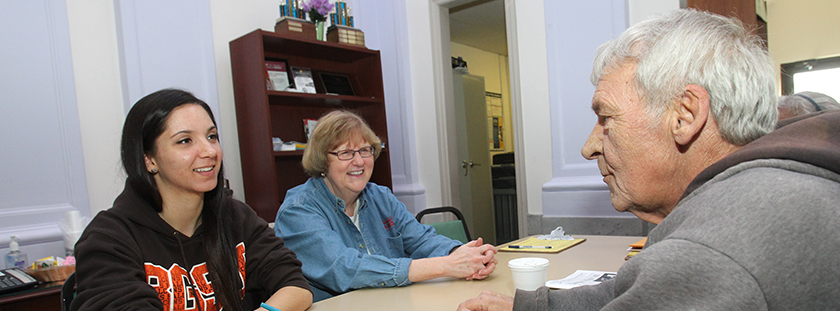Practicum/Field Experience

The final components of gerontology students' curriculum are the Practicum (GERO 4910) and Practicum Seminar (GERO 4930), which is normally taken during the senior year. The practicum for general gerontology students consists of a minimum of 400 hours experience in a program, agency or institution that serves older adults. Students must pay tuition during their practicum, and receive 12 semester hours of academic credit upon satisfactory completion of the experience. Students are normally on placement 40 hours per week. Alternative placement schedules must be approved by the Internship Coordinator.
The long-term care practicum consists of a minimum of 1,000-hour Administrator Residency in facility approved by the Internship Coordinator and supervised by a licensed nursing home administrator who has been practicing for at least two years in their state. The student must pay tuition during the Administrator Residency and receives 12 semester hours of academic credit upon satisfactory completion of the experience. The student is normally on placement 40 hours per week.
Students enrolled in practicum are required to keep a daily activity log during this experience, and submit this log to the Internship Coordinator. The activity log should provide a daily accounting of the hours worked, activities engaged in, and any insights gained from the activities. At the completion of the practicum, students must provide the Internship Coordinator with their daily activity log, as well as an 8-10 page paper on a project that they undertook as part of their practicum (e.g., an assessment of the feasibility of establishing a child care center in a life care community; a report on residents' satisfaction with meals served in a nursing home). The Practicum Seminar (GERO 4930) is taken concurrently with Practicum (GERO 4910). During the seminar, students who have completed/are close to completing their internships return to campus to share their practicum experiences with program faculty and students who are preparing to go on internship. The daily activity log and the final paper must be turned in during the practicum seminar.
Purposes of the Practicum
The basic purposes of the practicum, which is a key part of the curriculum, are to:
- Provide students with a professional experience and to provide an opportunity for career orientation.
- Give students an opportunity to put the knowledge they accumulated to use in a facility serving the elderly and thus begin to integrate knowledge and practice.
- Give general gerontology students an understanding of the workings of a specific program/agency/institution and its relationship to other programs/ agencies/institutions.
Prerequisites to Enrollment in the Practicum
- Students must be seniors at the time they begin the Practicum and have a grade point average of 2.5 one semester prior to the beginning of the Practicum.
- Students must complete at least 50 clock hours of volunteer or paid experience in one or more programs, agencies, or institutions serving the elderly.
- An interview with the Internship Coordinator will be conducted in the first month of the semester before the student believes that he/she is ready to begin practicum. If the Internship Coordinator does not feel that the applicant is ready to begin practicum, or does not have the potential for professional practice, he/she reserves the right to not accept the student for practicum at that time.
The matter of where the placement will occur is a negotiable matter among the student, the Internship Coordinator, and the facility.
Evaluations and Grading
The Practicum experience (i.e., GERO 4910) is graded on a satisfactory/unsatisfactory basis. The preceptor in the facility is provided an evaluation form by the Internship Coordinator. The evaluation form elicits information from both the preceptor and the student. The evaluation form is to be completed, signed, shared with the student, and returned at the end of the internship (i.e., after 400 or 1,000 hours have been completed depending on track). The Practicum Seminar (i.e., GERO 4930) letter grade is based on the student's performance as assessed by Internship Coordinator, the preceptor, and the successful completion of the daily activity log and other coursework as assigned in the course module (i.e. quizzes, case studies, discussion boards).
Updated: 02/18/2026 04:09PM
